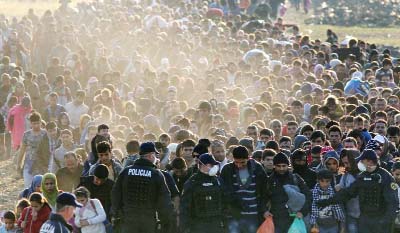
AFP, Ljubljana :
European countries facing an unprecedented influx of migrants on Monday cautiously welcomed new EU plans to help stem the crisis, following an emergency mini-summit at the weekend.
The European Union pledged to help set up 100,000 places in reception centres along the route through the Balkans, seeking to defuse seething tensions on its southeastern rim as tens of thousands of migrants head to northern Europe.
A 17-point plan, announced after emergency talks between the heads of 10 EU nations and non-EU Albania, Serbia and Macedonia, includes an undertaking that no country will let migrants through to an adjoining state without prior agreement.
It also speeds up information exchanges between countries to coordinate their efforts.
In the small Alpine nation of Slovenia, which has been swamped by migrants in recent days, government spokesman Bojan Sefic described the outcome as “a lot of progress” with the promise of “more cooperation”.
Prime Minister Miro Cerar had earlier warned it was “crucial” that commitments made at the summit were fulfilled without delay.
In Austria — the next transit country for migrants after Slovenia — Interior Minister Johanna Mikl-Leitner said decisions made in Brussels were “a step in the right direction”.
More than 670,000 people have reached European soil this year — many of them fleeing violence in Syria, Iraq and Afghanistan — in the continent’s worst migration crisis since World War II.
Meanwhile, the Philippines will not accept any refugees sent by Australia if they are expected to live in the Southeast Asian nation permanently, President Benigno Aquino said today. Aquino said he was “seriously considering” an Australian government proposal to accept some refugees but only if they were to transit in the Philippines before moving to another country.
“If this proposed agreement is not transitory in nature we feel we are not in a capacity at this point in time to afford permanent residency to these people,” Aquino told reporters.
“Australia can recognise that we do have a significantly bigger population than they do. We have challenges to meeting the needs of our people right now. We would want to assist but there are limitations.”
European countries facing an unprecedented influx of migrants on Monday cautiously welcomed new EU plans to help stem the crisis, following an emergency mini-summit at the weekend.
The European Union pledged to help set up 100,000 places in reception centres along the route through the Balkans, seeking to defuse seething tensions on its southeastern rim as tens of thousands of migrants head to northern Europe.
A 17-point plan, announced after emergency talks between the heads of 10 EU nations and non-EU Albania, Serbia and Macedonia, includes an undertaking that no country will let migrants through to an adjoining state without prior agreement.
It also speeds up information exchanges between countries to coordinate their efforts.
In the small Alpine nation of Slovenia, which has been swamped by migrants in recent days, government spokesman Bojan Sefic described the outcome as “a lot of progress” with the promise of “more cooperation”.
Prime Minister Miro Cerar had earlier warned it was “crucial” that commitments made at the summit were fulfilled without delay.
In Austria — the next transit country for migrants after Slovenia — Interior Minister Johanna Mikl-Leitner said decisions made in Brussels were “a step in the right direction”.
More than 670,000 people have reached European soil this year — many of them fleeing violence in Syria, Iraq and Afghanistan — in the continent’s worst migration crisis since World War II.
Meanwhile, the Philippines will not accept any refugees sent by Australia if they are expected to live in the Southeast Asian nation permanently, President Benigno Aquino said today. Aquino said he was “seriously considering” an Australian government proposal to accept some refugees but only if they were to transit in the Philippines before moving to another country.
“If this proposed agreement is not transitory in nature we feel we are not in a capacity at this point in time to afford permanent residency to these people,” Aquino told reporters.
“Australia can recognise that we do have a significantly bigger population than they do. We have challenges to meeting the needs of our people right now. We would want to assist but there are limitations.”

